Personal Injury
After Food Poisoning Scare at Chicken & Rice Guys, Do You Know Your Rights When Dining Out?

Improper food preparation is one source of food poisoning.
Chicken & Rice Guys shutdown restaurants and food trucks in Boston and Medford earlier this month for more than a week, after 14 people became ill with E. coli. Ten people had to be hospitalized. Given the widespread food poisoning outbreak, it is likely that there will be liability claims against Chicken & Rice Guys for the poisonings.
According to The Boston Globe, the illness was caused by the Shiga toxin-producing Escherichia coli 0157:H7, the most common strain of E. coli in the United States. The Mayo Clinic reports a person can contract this type of E. coli through:
- Exposure to contaminated food, such as raw vegetables or undercooked ground beef
- Contact with an infected person
- Exposure to food which has not been properly handled
Symptoms typically occur within three or four days and can include severe abdominal cramps, diarrhea, vomiting and nausea. Younger children and older adults are the most vulnerable. In some cases, kidney failure can develop and be fatal.
According to news reports, the City of Boston Inspectional Services gave Chicken & Rice Guys approval to re-open its Boston restaurants. The Medford location is also back in business, but the five local food trucks remain closed.
Boston Food Poisoning Cases
Unfortunately, food poisoning is quite common. Each year, 1 in 6 Americans become sick after consuming contaminated food, according to the Centers for Disease Control and Prevention
When restaurants and food trucks are the cause, food poisoning can spread quickly. Remember the Boston College outbreak of 2015? More than 130 students fell ill after eating at the Chipotle Mexican Grille Restaurant in Cleveland Circle. The contamination was initially believed to be E. coli, because the Chipotle chain was in the middle of a nationwide E. coli food poisoning outbreak, which ultimately sickened 60 people in 14 states.
As it turned out, the Boston College students were suffering from norovirus. At least one student filed a lawsuit against the local Chipotle’s.
Your Legal Rights at Restaurants
Diners have rights when eating out. Restaurants and food trucks must follow health regulations set by their local community and the Commonwealth of Massachusetts. The most basic regulations include:
- Employees must wash their hands before handling food
- Meat should be cooked to the proper temperature.
- The restaurant should be kept clean.
If you see a restaurant violating a health regulation, you can alert the staff or ask to speak to the manager. You can also report it to the city’s local health department.
The City of Boston is now offering a great resource for consumers: a letter-grade system for Boston restaurants. Consumers can search the grades online. At some point, restaurants will be required to post grades on storefronts or face fines of $300 per day.
If You Suffer Food Poisoning, Contact a Boston Personal Injury Lawyer
If you suffer food poisoning after eating at a restaurant, you may be entitled to file a claim for negligence and obtain financial compensation. Contact the lawyers of Breakstone, White & Gluck in Boston to help you investigate, determine if you have a case and identify who may be liable for your injuries. There are several parties who may be responsible, including the restaurant, food truck, food distributors and food manufacturers.
For a free legal consultation, contact Breakstone, White & Gluck at 617-723-7676 or 800-379-1244 or use our contact form.
Can the City of Boston Be Held Liable for Self-Driving Accidents? Attorney Marc Breakstone Interviewed as Legal Expert for Boston Herald Article
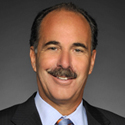 Attorney Marc L. Breakstone was quoted as a legal expert in a Boston Herald article titled “In Driver’s Seat With Insurance” (March 31, 2017). NuTonomy, the self-driving car company now testing its hands-free technology in Boston, has taken out a $5 million insurance policy to guard against lawsuits. Earlier this month, a self-driving Uber vehicle was involved in a car accident in Tempe, Arizona. Police found the Uber vehicle was traveling at 38 mph, below the speed limit, when the collision occurred and was not at fault. While there were no serious injuries, the accident has raised concerns.
Attorney Marc L. Breakstone was quoted as a legal expert in a Boston Herald article titled “In Driver’s Seat With Insurance” (March 31, 2017). NuTonomy, the self-driving car company now testing its hands-free technology in Boston, has taken out a $5 million insurance policy to guard against lawsuits. Earlier this month, a self-driving Uber vehicle was involved in a car accident in Tempe, Arizona. Police found the Uber vehicle was traveling at 38 mph, below the speed limit, when the collision occurred and was not at fault. While there were no serious injuries, the accident has raised concerns.
Attorney Breakstone was asked whether the City of Boston could be held liable if there is an accident involving NuTonomy. He said no, but read his full answer.
Attorney Reza Breakstone has written on the topic of self-driving cars and the legal questions they raise. In 2016, he co-wrote an article titled, “The Self Driving Car: Science Fiction Becomes Reality, Creating a Legal Quandary,” for The Litigator, the official publication of the Capital City Trial Lawyers Association in Sacramento, California.
For Massachusetts Motorcyclists, It’s Time for A Pre-Season Safety Check
 Motorcycle season is almost here. For riders, this means goodbye snow and cold; hello to the open road.
Motorcycle season is almost here. For riders, this means goodbye snow and cold; hello to the open road.
Good pre-season preparation is essential for motorcyclists. Take some time to inspect your motorcycle and helmet and review the Massachusetts driving manual. Review your auto insurance as well; most drivers and motorcyclists do not carry enough insurance.
Wear a Helmet. Under Massachusetts law, motorcyclists must wear helmets which have been approved by the U.S. Department of Transportation (DOT). Helmets save lives so make sure yours is in good condition. If you have been involved in a motorcycle accident or fall, replace your helmet.
Clothing and Gear. Select the appropriate clothing and gloves for driving conditions.
Licensing and Insurance. Class M licenses are required for Massachusetts motorcyclists. Anyone who is 16 or older may take the Class M exam, unless the Registry of Motor Vehicles (RMV) has taken away your right to operate.
Once you pass the exam, you must obtain auto insurance for your motorcycle. It pays to do your homework here. Under the law, Massachusetts motorcyclists are only required to purchase compulsory insurance. But you can and should also purchase optional coverage for more protection.
We encourage you to ask your insurance agent about insurance laws for motorcycles and about coverage for accidents involving underinsured and uninsured drivers. If you are ever injured and the driver responsible does not have adequate insurance, you may have to look to your own insurance policy to fill in the gap and pay some of your medical bills and other compensation.
Insurance companies do not provide for Personal Injury Protection (no-fault benefits) on motorcycle policies. We strongly recommend that you purchase Medical Payments coverage. That coverage will provide insurance for you and your passenger in the event of an accident.
Follow the Rules of the Road. Massachusetts motorcyclists must follow the same rules as other drivers, but there are some differences. If you have questions, you can quickly check the Massachusetts Motorcycle Manual online.
Defensive Driving. One topic covered in the manual is defensive driving. Commit to keeping a safe distance between you and other vehicles on the roads to avoid a motorcycle accident.
Motorcycle Accident Statistics
- Nearly 5,000 people died in motorcycle accidents in 2015, up 8 percent from 2014, according to the National Highway Traffic Safety Administration (NHTSA). In 2015, 88,000 motorcyclists were injured.
- Motorcycle deaths occurred 27 times more frequently than other fatalities on the road, according to NHTSA figures.
About Breakstone, White & Gluck
The lawyers at Breakstone, White & Gluck of Boston have over 100 years combined experience representing motorcyclists who have been seriously injured by the negligence of drivers. Our attorneys have recently negotiated settlements of $3.75 million, $3.5 million and $1.25 million for injured motorcyclists. Read more about our motorcycle accident case results.
Safety Checklist: Check Your Baby Strollers and Other Children’s Products Before Spring
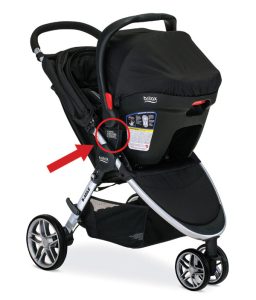 As Spring approaches, parents will be reaching for outdoor toys and children’s equipment. Baby strollers are one of the first products to come out.
As Spring approaches, parents will be reaching for outdoor toys and children’s equipment. Baby strollers are one of the first products to come out.
Before you use a stroller, check for loose or worn parts. Then find out if the stroller has been subject to a product recall or caused injury. You can check online now on the Consumer Product Safety Commission website.
Baby Stroller Recalls. We started with baby strollers because there have been several baby strollers recalled in the past year, including Britax, Aria Child and Phil & Teds strollers. Britax has actually issued two sets of recalls over the past 15 months, one for 60,000 strollers in January 2016 and another for more than 700,000 strollers in February 2017.
In December 2016, Aria Child recalled 29,000 strollers, instructing consumers to stop using the products and contact the company for a free replacement. Five consumers were pinched by the hinge mechanism of the $180 stroller. Four of these consumers needed stitches for cuts. In addition, 71 strollers malfunctioned, by folding unexpectedly during use. Twelve adults and children suffered bumps or bruises. One adult fell and fractured a wrist and elbow.
In February, Britax Child Safety Inc. recalled more than 700,000 strollers, including the Britax B-Agile and BOB Motion strollers. The strollers had defective mounts which attached to the car seat carrier. Britax received 44 reports of car seats detaching and 26 injuries including scratches, bruises and bumps to the head. More than 1,300 receiver mounts on strollers were damaged. Britax has instructed parents not to use the strollers with the travel system and to contact the company for a repair kit.
Check for Other Recalls. As consumers, we are not always aware of recalls, especially if products are passed down or are not registered with the manufacturer. Make it an annual routine to check on product recalls each Spring before your child starts using them.
Checklist of Toys and Children’s Products to Check for Safety Before Spring
Dressers. Ikea recalled 29 million dressers in June 2016, following the deaths of six children. The Consumer Product Safety Commission recommends parents always secure dressers to a wall.
Lane Furniture. The Lane Furniture recall of cedar chests is a painful topic for many people in Massachusetts. We only include it here as an example of a product which has been recalled, yet continues to harm consumers.
In 2014, two children from Franklin, Mass. tragically suffocated while playing and becoming trapped in a Lane Furniture cedar chest which had been recalled because the latch was unsafe. This was not the first time a child was killed. According to the Consumer Product Safety Commission, 34 children have become trapped and died in similar chests since 1996. Lane Furniture had first recalled 12 million of the cedar chests in 1996. But many chests are likely still in use with the dangerous latch in place, in homes, in storage and consignment shops. They are so dangerous because they are nondescript and would not stand out to many consumers.
Car Seats. Car seats or child passenger safety seats are a source of frustration for many parents. If you are struggling with yours, check online to see if it has been recalled. Millions of parents were impacted by the Graco car seat recalls in recent years. The buckles in these car seats were defective, forcing parents to cut the straps to free children in some cases.
Outdoor Toys to Check. This time of year, make sure to also check for recalls related to swingsets, bicycles, pools and other outdoor toys. Even if these products are not recalled, carefully inspect them. They age; repair any broken pieces. Throw away products which are broken and could cause injury. Remember, if a product can harm your child, it can cause someone else injury. Take it apart before you throw it away.
Conclusion
In a perfect world, you would not have to inspect your children’s products periodically or check for product recalls. Manufacturers have a responsibility to properly design and test products and should take those steps. When they do not, they can be found liable for injuries resulting from defects. They may also be subject to government investigation and fines.
About Breakstone, White & Gluck
The Boston product liability attorneys at Breakstone, White & Gluck have over 100 years combined experience representing those injured by defective products and medical devices. In recent years, we have obtained settlements of $1.15 million and $2.5 million for individuals injured by defective products or products which were misused.
If you have been injured, learn your rights. For a free legal consultation, contact us at 800-379-1244 or 617-723-7676 or use our contact form.
Report: Dramatic Rise in Traffic Accidents in 2016
Driving on U.S. roads became more dangerous in 2016. Preliminary data from the National Safety Council shows more than 40,000 people died in motor vehicle crashes last year, a 6 percent increase from 2015.
- This was the first year more than 40,000 people have died in traffic accidents since 2007.
- According to The New York Times, 2015 and 2016 saw a 14 percent increase in traffic deaths, the largest two-year increase in more than half a century.
- In addition to deaths, an estimated 4.6 million people suffered serious injuries in car accidents last year. The total costs came to $432.5 billion, for motor vehicle deaths, injuries and property damages.
- In Massachusetts, 399 traffic deaths were reported in 2016, a 13 percent increase over the prior year (these are also preliminary figures).
The National Safety Council said lower gasoline prices and an improving economy may be helping to fuel the rise in traffic deaths. Others point to seat belt laws and texting while driving and other distracted driving behaviors.
If you drive, take to the roads safely. Follow the speed limit and make sure everyone in your family puts down their cell phone while driving.
Read our Article: Understanding and Buying Auto Insurance in Massachusetts
Until it happens to you, few people understand the costs associated with a car accident, and the toll on your physical health and emotional well-being. We hope you are never injured, but encourage you to read our article to protect yourself and your family.
Use Space Heaters with Caution
During these cold and frigid days of winter, some of us are reaching for space heaters. If you can, first try to keep warm other ways: reach for blankets or an extra layer of clothing. But if you must use a space heater, use it with caution and make sure you use it properly. According to the National Fire Protection Association (NFPA), space heaters are involved in 32 percent of home heating fires and 79 percent of home heating fire deaths in this country. They are the second leading cause of home fire deaths behind smoking.
There have been several heartbreaking stories this winter. In Baltimore, six children were killed in a devastating fire last month. Officials are still investigating, but say it may have been sparked by a space heater. Just a few days ago, a 50-year-old Fall River woman tragically died after a space heater fire ignited her home.
According to the State Fire Marshal’s office, Massachusetts fire departments responded to 133 space heater fires from 2006 to 2015, resulting in 9 civilian deaths and 22 civilian injuries. Some 31 fire service members suffered injuries.
The Today Show aired a segment this morning, which shows just how quickly space heater fires can ignite. We encourage you to watch it.
Safety Tips for Properly Using a Space Heater
Three Feet Rule. Keep space heaters 3 feet away from all furniture and people. Put them in the center of the room.
Plug in to Wall. Plug space heaters directly into the electrical socket on the wall. Many extension cords cannot handle the strong level of electricity passed on from a space heater.
Beware of Automatic Switches. These switches are helpful, but are not a substitute for you turning off your heater yourself, unplugging it and putting it away.
Turn Space Heaters Off Properly. Turn off space heaters before you go to bed when no one can monitor them. Turn it off anytime you cannot supervise it.
Keep Space Heaters Away from Water. Do not use space heaters near sinks or in bathrooms.
Create a Fire Escape Plan. Family members should all know how to properly evacuate the home and be aware of all the routes.
Check Your Fire Alarm Once a Month. This is always a good idea, but extra important during the winter months.
Inventory Your Home. Because half of all home heating fires occur during December, January and February, now is a good time to walk through your home and look for hazards. Look outside, too. Make sure your home’s outside furnace vent is clear of snow. A blocked vent can put your family at risk for carbon monoxide poisoning.
Take Extra Precautions if Children Are in Your Home
Take extra precautions if you live with children. Establish a child-free (and pet-free) zone if you set up a space heater. Keep children as far away from the space heater as possible at all times. Also keep toys away. When finished, turn the space heater off and unplug it. Put it in a safe place which it out of reach of children.
Do You Have Insurance for Your Drone?
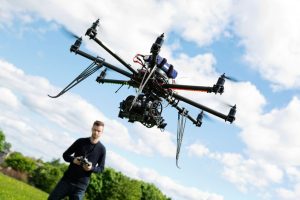 More than a million drones were sold this holiday season. If one happened to land in your pile of presents, remember that taking to your neighborhood skies comes with responsibilities. We offer a few reminders about insurance and protecting yourself from financial liability if there is injury or property damage. As a drone operator, you want to make sure that you will be able to pay for damages or personal injury that was caused by your negligence.
More than a million drones were sold this holiday season. If one happened to land in your pile of presents, remember that taking to your neighborhood skies comes with responsibilities. We offer a few reminders about insurance and protecting yourself from financial liability if there is injury or property damage. As a drone operator, you want to make sure that you will be able to pay for damages or personal injury that was caused by your negligence.
Homeowners and Renters Insurance. Start by reviewing your homeowners and renters insurance policies. Then speak to your insurance agent to learn if drone-related accidents are covered.
According to the Insurance Information Institute, drones are most likely covered under these policies. The liability portion of your homeowners insurance may cover you in lawsuits for bodily injury or property damage. Your policy may also provide no-fault medical coverage if someone is accidentally injured by your drone. But there are limits; medical bills for you and family members may not be covered by no-fault medical coverage.
Another reason to have insurance for your drone: If your drone causes bodily injury or property damage, and a claim is brought against you, proper insurance will not only cover the damages; the insurance company will also provide a lawyer to defend the claim against you.
Check with your insurance agent. The insurance industry is actively discussing this topic. Already, some insurers may exclude drone-related accidents from homeowners insurance policies. Others may choose to do so in the future.
Car Insurance. Your auto insurance policy may cover property damage resulting from crash landings or related accidents. Ask your auto insurance agent.
Commercial Users. If you operate a drone for business (even for a part-time business), you should ask your agent if you are covered. This would not typically be covered under your homeowners insurance policy.
Safety Reminders. Never use your drone recklessly and always follow current safety regulations. Drone owners are required to register drones with the FAA and fly at or below 400 feet. Failure to do so could result in a fine. To learn more, watch this safety video from the FAA.
Theft. Consider theft insurance if it make sense. Some drones are small and can be easily stolen. But remember many homeowners have to pay a deductible if they file a claim. If you own an inexpensive drone it will likely be less than your deductible. Maybe it was time to upgrade to the fancier drone anyway.
Memberships. If you do not have adequate coverage, consider your options. You may be able to buy more insurance coverage from your carrier or research other insurance carriers. You may also qualify for coverage if you belong to a membership organization or club. The New York Times reported the Academy of Model Aeronautics offers group liability coverage as part of its $75 per year membership. This may pay for damages after your homeowners insurance policy is exhausted.
Time to Get Started
If you are a drone owner, we hope you take the time to check with your insurance agent so you understand your potential liability. Drone crashes can happen on your property or a neighbor’s property and you want to be prepared.
Here are two resources:
“Getting a Drone as a Gift? Check Your Insurance,” New York Times.
Attorney Marc L. Breakstone Quoted in Massachusetts Lawyers Weekly Article on Antiquated Sidewalk Liability Laws
Attorney Marc L. Breakstone was quoted in a front-page Massachusetts Lawyers Weekly article about common law liability for injuries caused by sidewalk defects. The current common-law standard dates back centuries and prohibits many plaintiffs from recovering compensation for injuries. But a recent Appeals Court ruling may have finally set the stage for change.
Attorney Breakstone welcomes the idea. “I think that the common law is a living body of principles that has to evolve as social conditions and the realities of life evolve,” he said.
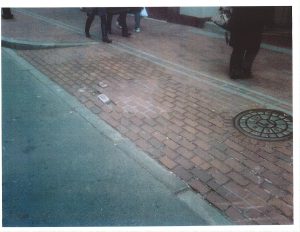 Earlier this month, the Appeals Court ruled in the case of Halbach, et al. v. Normandy Real Estate Partners, et al., concurring that a Superior Court judge had correctly granted summary judgment to the defendant, 100 & 200 Clarendon LLC, which operated, leased and maintained the John Hancock Tower and a neighboring garage in Boston.
Earlier this month, the Appeals Court ruled in the case of Halbach, et al. v. Normandy Real Estate Partners, et al., concurring that a Superior Court judge had correctly granted summary judgment to the defendant, 100 & 200 Clarendon LLC, which operated, leased and maintained the John Hancock Tower and a neighboring garage in Boston.
The Appeals Court rejected the plaintiffs’ argument that the defendant had been negligent in keeping the sidewalk free from defects and had failed to uphold their duty “to ensure a safe pedestrian walkway.”
The Appeals Court said the plaintiffs were suggesting “an entirely new duty” not recognized by state common law. The Appeals Court further noted that there is no affirmative duty to inspect and repair public sidewalks or notify the city.
In Massachusetts, cities generally have limited liability of $5,000 for personal injuries and property damage from defective ways, which also leaves plaintiffs who are injured with limited remedy.
Next Steps
In 2009, a man fell on uneven sidewalk after leaving his office at the John Hancock Tower in Boston. He suffered a bilateral rupture of his quadriceps tendon. After the fall, the defendant, 100 & 200 Clarendon LLC, did make some repairs, with no attempt to seek reimbursement from the city of Boston.
The man and his wife filed a lawsuit in Suffolk Superior Court in February 2012 and filed a motion for summary judgment in January 2014.
Appeals Court Judge James R. Milkey wrote that “the plaintiffs have a more forceful case for … a change in the law than the majority opinion suggests.”
The Supreme Judicial Court could now review the Appeals Court ruling and decide whether to extend a duty for sidewalks to private owners.
Attorney Breakstone told Massachusetts Lawyers Weekly this would be a “baby step for the evolution of our tort law.” It is a widely accepted principle that businesses making a profit from the customers they attract onto their premises have to provide safe egress, he said.
In 2010, the Supreme Judicial Court decision in Papadopoulos v. Target Corp. abolished the common-law distinction between natural and artificial accumulation of snow and ice. In Massachusetts, property owners are now responsible for clearing all areas of their property under the standard of “reasonable care,” regardless of whether they created the snow pile or if it naturally formed.
Read the full article on the Massachusetts Lawyers Weekly website. Subscription required for access.
About Attorney Marc L. Breakstone
Marc L. Breakstone has established a reputation as one of the top medical malpractice and personal injury lawyers in New England. His record-setting settlements and verdicts have earned him the distinction of being selected as one of the Top 100 Super Lawyers in New England and Top 100 Super Lawyers in Massachusetts. He has also been selected by his peers as one of the top medical malpractice plaintiff’s lawyers in the Super Lawyer balloting. In 2002, Attorney Breakstone was honored as one of ten “Lawyers of the Year” by Massachusetts Lawyers Weekly. More on Marc Breakstone.
About Breakstone, White & Gluck
The Boston personal injury attorneys at Breakstone, White & Gluck have over 100 years combined experience handling personal injury and premises liability cases for those who have been seriously injured. If you have been injured, it is important to learn your rights. For a free legal consultation, contact us at 800-379-1244 or 617-723-7676 or use our contact form.
Toy Safety Reminders for Holiday Shoppers
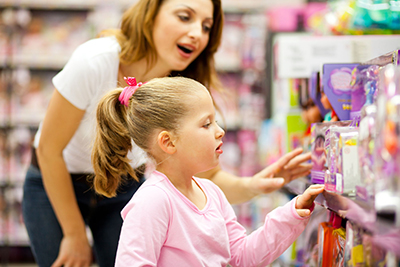
Many of us will shop for a child this holiday season. Do your homework first, so you purchase gifts which are both safe and fun to use.
Each year, children and young adults are seriously injured or killed while playing with dangerous and defective toys. We should be able to trust that the toys we purchase from reputable stores are safe, but that is not always the case. In 2015, there were an estimated 185,500 toy-related, emergency department-treated injuries and 11 deaths to children younger than 15 years old, according to the Consumer Product Safety Commission (CPSC). Riding toys, specifically non-motorized scooters, were associated with the most toy-related injuries.
Before you shop, here are a few tips:
Check out the CPSC recall page. Check the recall page before you shop. You can search for a specific toy, by manufacturer or in several different useful ways.
Read labels. Look for labels with age recommendations and follow them. If you shop online, double check the age recommendation and other labels once you receive the product box. What you see on the computer screen may not be what you actually receive.
Read the Top 10 Worst Toys 0f 2016 list. Take time to read this list and make sure not to buy any toy mentioned on it. Another toy to note: the Tonka 12V Ride-On Dump Truck. It has not been recalled, but Toys R Us has pulled it off shelves after one of the toys caught fire in Bellingham, Washington over the weekend.
No small pieces. Do not buy toys with small pieces for small children under three years old. Consider every part, even things such as small plastic eyes and noses on stuffed animals and dolls which could become loose.
Plastic film. If you purchase toys with mirrors or similar surfaces, remove the protective plastic film before giving the gift to a child. It is a choking hazard.
Avoid magnets. Do not purchase toys or adult gifts with small magnets. If a small child swallows two or more magnets, they attract in the stomach. Surgery may be required to remove the magnets and the child may suffer very serious complications. Thousands of children have these suffered these injuries and required surgeries. At least one child died in recent years, according to news stories.
The CPSC and companies have recalled many of the popular magnet toy sets in recent years, such as Buckyballs toys, and strengthened federal standards. But some are still sold. Steer clear of any product with small magnets. Once they are brought into a house, small pieces can fall under furniture or other areas and stay there for years until they are discovered by a child. They are hard to thoroughly clean up.
Electrical toys. Children should use toys with electrical components under adult supervision and follow age recommendations. Before you buy an electrical toy, check with a child’s parents to see if it is appropriate.
Cords and strings. Do not buy toys with long strings for infants and young children. A child can wrap a long string around his or her own neck and strangle themselves.
Batteries. Do not purchase toys which operate with small circle button batteries.
Balloons. Children can suffocate from balloons and the CPSC advises against letting children younger than 8 play with balloons. One risk is a child can swallow a balloon or suck it in while blowing it up. After the balloon pops, a child can also choke on the broken pieces.
Read More
Project KidSafe Update: Breakstone, White & Gluck Supports Ashland Farmers Market and Tewksbury Police

Our Project KidSafe campaign recently stopped in Ashland and Tewksbury, to donate bicycle helmets to kids at fun events geared toward safety.
On June 5th, the Tewksbury Police Department hosted its Annual Bike Safety Rodeo at Tewksbury Memorial High School. Children came out to ride despite some rain early in the morning. They circled the parking lot, ran an obstacle course and enjoyed time with other kids – and the Lowell Spinners mascot, Canaligator. Cyclists of all ages were offered free bicycle safety inspections.
Children who needed a new helmet were offered one from Breakstone, White & Gluck and the Project KidSafe campaign. Tewksbury police officers partnered with us on the donation and fit the helmets for the kids.
“Please thank the attorneys for us for helping to keep our community safe!” Tewksbury police wrote us.
The Tewksbury Police Department actively works to protect cyclists of all ages with an annual Helmet Reward program. If an officer spots you riding a bicycle and wearing a helmet, you may just win tickets to a Lowell Spinners game. Local businesses provide support for the initiative.
Wearing a bicycle helmet is required for riders 16 years old or younger in Massachusetts, but it is good practice for anyone riding a bicycle. According to the Insurance Institute for Highway Safety, wearing a bicycle helmet can reduce the risk for a serious head injury by 50 percent. Other studies have reported it offers even more protection.
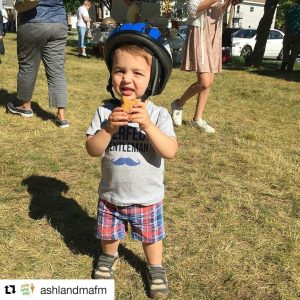 On June 18th, the Ashland Farmers Market celebrated its 5th anniversary. Breakstone, White & Gluck donated 75 children’s bicycle helmets for the event. We thank students and members of the community who took time to distribute and fit helmets for the kids.
On June 18th, the Ashland Farmers Market celebrated its 5th anniversary. Breakstone, White & Gluck donated 75 children’s bicycle helmets for the event. We thank students and members of the community who took time to distribute and fit helmets for the kids.
The Ashland Farmers Market is organized by volunteers, with a goal of providing local farmers and small businesses a venue to sell goods to the community. Visitors can get produce and food there, as well as nutrition tips and suggestions on environmentally friendly practices for home and commuting. The committee has made bicycle safety a priority and this is the third year we have donated bicycle helmets.
About Project KidSafe
Breakstone, White & Gluck has donated over 10,000 bicycle helmets to children in Massachusetts through our Project KidSafe campaign. We launched our campaign in 2013, with a simple goal: to help children ride safely and prevent head injuries. This year, we are proud to donate helmets to children at community events in Boston, Cambridge, Arlington, Somerville, Dedham, Worcester and other communities. We are also making donations to more than 10 local police departments.


